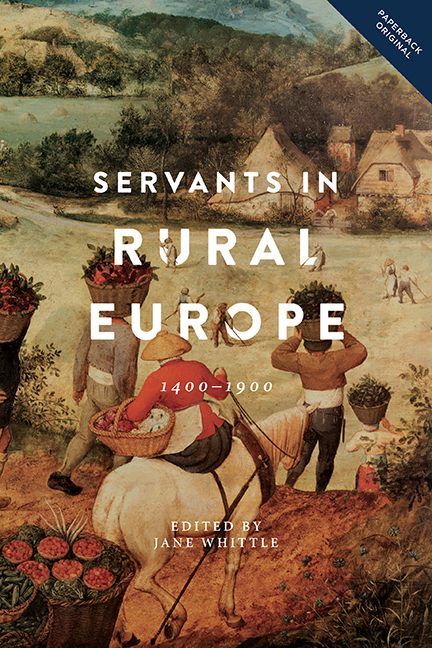Book contents
- Frontmatter
- Contents
- List of Figures
- List of Tables
- Note on Terminology
- List of Contributors
- Introduction: Servants in the Economy and Society of Rural Europe
- 1 The Employment of Servants in Fifteenth- and Sixteenth-Century Coastal Flanders: A Case Study of Scueringhe Farm near Bruges
- 2 The Institution of Service in Rural Flanders in the Sixteenth Century: A Regional Perspective
- 3 A Different Pattern of Employment: Servants in Rural England c.1500–1660
- 4 Female Service and the Village Community in South-West England 1550–1650: The Labour Laws Reconsidered
- 5 Life-Cycle Servant and Servant for Life: Work and Prospects in Rural Sweden c.1670–1730
- 6 Servants in Rural Norway c.1650–1800
- 7 Rural Servants in Eighteenth-Century Münsterland, North- Western Germany: Households, Families and Servants in the Countryside
- 8 Rural Servants in Eastern France 1700–1872: Change and Continuity Over Two Centuries
- 9 The Servant Institution During the Swedish Agrarian Revolution: The Political Economy of Subservience
- 10 Farm Service and Hiring Practices in Mid-Nineteenth-Century England: The Doncaster Region in the West Riding of Yorkshire
- 11 Dutch Live-In Farm Servants in the Long Nineteenth Century: The Decline of the Life-Cycle Service System for the Rural Lower Class
- 12 Rural Life-Cycle Service: Established Interpretations and New (Surprising) Data – The Italian Case in Comparative Perspective (Sixteenth to Twentieth Centuries)
- Select Bibliography
- Index
- People, Markets, Goods: Economies and Societies in History
12 - Rural Life-Cycle Service: Established Interpretations and New (Surprising) Data – The Italian Case in Comparative Perspective (Sixteenth to Twentieth Centuries)
Published online by Cambridge University Press: 18 April 2018
- Frontmatter
- Contents
- List of Figures
- List of Tables
- Note on Terminology
- List of Contributors
- Introduction: Servants in the Economy and Society of Rural Europe
- 1 The Employment of Servants in Fifteenth- and Sixteenth-Century Coastal Flanders: A Case Study of Scueringhe Farm near Bruges
- 2 The Institution of Service in Rural Flanders in the Sixteenth Century: A Regional Perspective
- 3 A Different Pattern of Employment: Servants in Rural England c.1500–1660
- 4 Female Service and the Village Community in South-West England 1550–1650: The Labour Laws Reconsidered
- 5 Life-Cycle Servant and Servant for Life: Work and Prospects in Rural Sweden c.1670–1730
- 6 Servants in Rural Norway c.1650–1800
- 7 Rural Servants in Eighteenth-Century Münsterland, North- Western Germany: Households, Families and Servants in the Countryside
- 8 Rural Servants in Eastern France 1700–1872: Change and Continuity Over Two Centuries
- 9 The Servant Institution During the Swedish Agrarian Revolution: The Political Economy of Subservience
- 10 Farm Service and Hiring Practices in Mid-Nineteenth-Century England: The Doncaster Region in the West Riding of Yorkshire
- 11 Dutch Live-In Farm Servants in the Long Nineteenth Century: The Decline of the Life-Cycle Service System for the Rural Lower Class
- 12 Rural Life-Cycle Service: Established Interpretations and New (Surprising) Data – The Italian Case in Comparative Perspective (Sixteenth to Twentieth Centuries)
- Select Bibliography
- Index
- People, Markets, Goods: Economies and Societies in History
Summary
‘When I was eleven years old I was already a servant (vaché), it was the same for everyone’, Dalmazzo Giraudo (born 1893), a peasant from Piedmont reported in 1970. My parents ‘sent me out to serve. I stayed for two years’, Ferruccio Preti wrote in 1950 in one of the autobiographies of militants preserved in the archive of the Communist Party in Bologna, where the experience as farm servants (garzoni) was one of the most common themes. Almost all boys from agricultural labourers’ (braccianti) families became servants as soon as they had attended primary school, Franco wrote in a blog referring to the interwar period in countryside around Ravenna. For peasants, having a servant was as common as having a dog, Francesco Salvatici (1933–2006) maintained in 2005, remembering his childhood in Tuscany. There were hundreds of prospective masters who tried to find rural servants and vice versa, Crescenzo Iadanza (born 1921), reported in 2005, referring to the square in Benevento, in southern Italy, where he too, aged thirteen or fourteen, had tried (unsuccessfully) to find a job as a servant (valano).
These testimonies suggest that rural service was very common in Italy. Yet – broadly speaking – according to influential scholars this was not the case. Who is right? Historians or former servants? In this chapter I will try to assess the spread of rural service in Italy between pre-industrial times and the twentieth century. I will focus especially on life-cycle service, which since the 1960s has increasingly been considered a phenomenon with far-reaching consequences. Indeed, it has been suggested that it was a crucial component of the different European family-formation systems and marriage patterns, which in turn have been regarded as decisive in leading to low/high-population-pressure societies; in allowing for larger/smaller saving and accumulation; and, ultimately, in creating more/fewer opportunities for economic development. Moreover, the high/low presence of life-cycle servants has been deemed critical in fashioning weak/strong family ties and in stimulating the development of public or private/familial welfare systems.
- Type
- Chapter
- Information
- Servants in Rural Europe1400–1900, pp. 227 - 254Publisher: Boydell & BrewerPrint publication year: 2017



